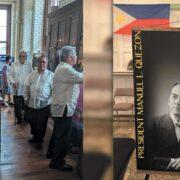To honor the extensive and often overlooked achievements of the Asian Pacific American (APA) community, the United States designated the month of May as Asian Pacific American Heritage Month (APAHM).
Just as the U.S. celebrates Black History Month in February, members of Congress in 1977 decided to introduce resolutions to designate a period in which to celebrate the rich history of Asian Americans and Pacific Islanders in the U.S.
It started off in 1979 when Asian/Pacific American Heritage Week was celebrated during the first ten days in May.
Presidents in the 1980s then continued that tradition until 1990, when then-President George H.W. Bush signed a new law which expanded the observance to the entire month; then in 1992, the U.S. officially began observing Asian/Pacific American Heritage Month in May.
Soon after Asian/Pacific American Heritage Month was established, Congressman Norman Y. Mineta (D-California) in 1994 founded the Congressional Asian Pacific American Caucus (CAPAC), a caucus made up of Congress members who were of Asian and Pacific Islander descent to advocate for the APA community.
According to the official legislation that established the caucus, CAPAC is designed “to ensure that legislation passed by the United States Congress, to the greatest extent possible, provides for the full participation of Asian Americans and Pacific Islanders and reflects the concerns and needs of the Asian American and Pacific Islander communities.”
It was important to designate the month of May because it coincides with the first wave of Japanese immigrants to the United States on May 7, 1843; the month also commemorates the construction of the first transcontinental railroad— which was built largely on the labor of Chinese immigrants—on May 10, 1869.
Designating a month honoring the APA community was a huge step in recognizing the historic achievements and celebrating the cultures within the community.
The APA community—as detailed in the resolution—encompasses all nationalities, cultures and ethnic populations in the Asia continent as well as the Pacific Islands; altogether, that includes hundreds of unique cultures.
“Asian Pacific American Heritage Month is a time to celebrate the many achievements and contributions that Asian Americans and Pacific Islanders have made to our nation,” Congresswoman Judy Chu (D-California) said in a statement released earlier this month. “From the Chinese railroad workers who helped to build our first transcontinental railroad, to trailblazers like Dalip Singh Saund, the first Asian American ever elected to the U.S. Congress, to visionaries like Patsy Mink, a fierce champion for women’s rights who helped to pass Title IX legislation – AAPIs have played an integral role in contributing to the vibrancy of our country.”
APAs who have made great strides in entertainment and pop culture have also been commemorated in various ways this month.
Earlier in May, IDENTITY LA, a concert commemorating the community, returned to Los Angeles to celebrate the work of APA artists and creatives, to inspire young artists in the community to chase their dreams and to share the Asian American identity with folks of all heritages.
“It’s to show [our] pride as being Asian American because we’re not guests in this country,” LA Councilmember David Ryu told the Asian Journal earlier this month. “This is our country and we’ve helped build this country. It’s to empower the younger generations. It’s also not to only celebrate amongst ourselves but share our culture with our neighbors who are not Asian American because we draw strength from diversity, and it’s only when we learn about each other’s differences that we grow stronger together.”
Throughout the month of May, all branches of the Los Angeles Public Library (LAPL) are hosting special events for Asian/Pacific American Heritage month like film screenings, calligraphy lessons, Japanese tea ceremonies, Bollywood nights and professional panels. For a calendar list of events, visit http://www.lapl.org./





